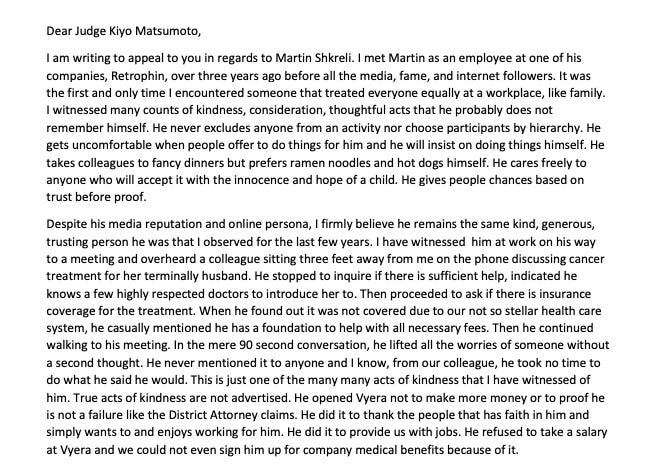Many companies have the problem of being a “boys’ club.” Martin Shkreli’s companies had a more complex problem of being a “Martin Shkreli club.”
A recurring theme I heard over and over again – from testimony in his criminal trial, in anecdotes from his friends, in legal filings, and from Martin himself – was that his businesses were always mired in turmoil, which often revolved around or was directly caused by him. Enhancing the discord, he saw people he worked with as either being “for” him or “against” him, a characteristic that sounded a lot like “splitting” in the context of personality disorders.
To a certain extent, though, his assessment was right. People either hated him or loved him. It was easy to understand why. He was impulsive, unorthodox, impatient and mercurial. There were many stories about him ranting at employees when angry like a precocious child having a temper tantrum. Some colleagues like Steve Aselage, the executive who took over his first drug company Retrophin after kicking Martin out, had enough of him and actively schemed to get rid of him.
And on the other side, there were employees who enjoyed Martin’s zany and energetic style and his occasional flashes of brilliance. They believed in him, they admired his talents, and they remained loyal no matter how difficult or unpredictable he could be. A number of them, surprisingly given his reputation for sexual harassment and lewd comments on social media platforms, were women.
One woman (I will call her “Victoria,” which is not her real name, because she has not been identified anywhere else in the media) worked for Martin at both of his drug companies: Retrophin and then Turing, which was later renamed Vyera. In a letter she wrote to U.S. District Judge Kiyo Matsumoto for Martin’s sentencing in 2018, she provided detailed examples of his compassion, sense of fairness, sincerity, and humbleness when dealing with his employees – all characteristics which many far more “respectable” CEOs often lack.
When she joined Retrophin around 2015, “it was the first and only time I encountered someone that treated everyone equally at a workplace, like family,” she wrote. “He never excludes anyone from an activity nor choose[s] participants by hierarchy. He gets uncomfortable when people offer to do things for him and he will insist on doing things himself.”
While he happily took colleagues out for “fancy dinners” he was content on his own with “ramen noodles and hot dogs,” she continued. She added that he was “kind, generous” and “trusting,” and willing to step in and provide help when needed without asking anything in return.
In her letter, she described his behavior after he overheard an employee discussing her terminally ill husband’s cancer treatment. Martin “stopped to inquire if there is sufficient help, [and] indicated he knows a few highly respected doctors to introduce her to.” He also asked her if insurance covered the treatment. When she replied that it did not, he referred her to his charitable foundation, which covered her bills. Victoria mentioned that she had spoken to the employee later, and discovered that he did exactly as he promised.
“This is just one of the many many acts of kindness that I have witnessed of him,” she wrote. She added that he also “refused to take a salary at Vyera and we could not even sign him up for the company medical benefits because of it.”
Another woman who worked for him at both companies but had since left, and who also sent a letter to the judge, described him as “a great boss” who was “engaging to all employees, knew all their names, and took interest in their lives.” She credited her experience working for him with shaping her career trajectory.
Of course, those views were expressed specifically in hopes of persuading the judge to grant Martin, a person they considered a friend, leniency. There may have been some less-glowing thoughts and observations left out. Two other women who had worked for Martin, speaking in different contexts, had far less generous interpretations.
One was Eve Costopoulos, a former general counsel for Vyera…













